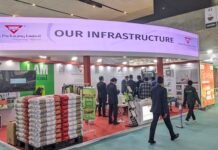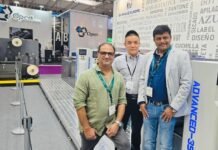
The Global Conclave on Plastic Recycling and Sustainability was held from 4 to 7 July at Bharat Mandapam, Pragati Maidan. Organized by the All-India Plastics Manufacturers’ Association and the Chemicals & Petrochemicals Manufacturers’ Association, the show brought together plastic recyclers from across the length and breadth of the country.
The four-day event served as a significant platform for discussing innovations and advancements in plastic recycling. It has brought together global leaders to share their perspectives on creating a greener tomorrow through sustainable practices in the plastics industry.
Surya Compounds & Masterbatches — Focus on recycling
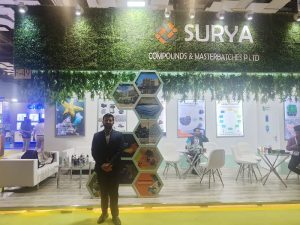
Surya Compounds & Masterbatches at the company’s stand at the Global Conclave on Plastic Recycling and Sustainability.
Photo PSA
New Delhi-based Surya Compounds & Masterbatches is into virgin and reprocessed compounding and production of masterbatches. The company serves many industries, including plastics, automotive, wires and cables, packaging and consumer goods and applications. The company has three plants in Narela in Delhi, Kundli in Haryana and Ghiloth in Rajasthan.
Masterbacthes are used to impart an add-on feature to a compound or products, which is usually color or some additive properties such as UV resistance, heat resistance, fragrance, and anti-microbial properties.
Surya Compounds & Masterbatches promoted its compounds and masterbatches at the event and displayed how plastic can be used in a versatile manner in different industries.
The company is working with clients on a pan-India basis and is trying to serve niche markets, Rachit Bansal, marketing director at Surya Compounds & Masterbatches said, adding the company utilizes quality materials in its production. The materials are lab-tested and imbibe properties from one lot to another, he said. Surya Compounds & Masterbatches was initially into virgin material reprocessing but the company’s management realized the importance of plastic recycling and tries to recycle as much plastic as they can, he said.
“It’s the need of the hour that the materials we are processing are properly lab-tested and have a technical edge like American and Japanese companies, which adhere to certain guidelines while manufacturing materials. This has been missing in India for the last few decades but now we are keen to work sequentially so that there is a term called Indian Engineering just like German Engineering or Japanese Engineering,” Bansal said.
Bansal said the response at the show was okay as there was not much awareness about the exhibition, but it was good to participate as they met prospective customers and saw new things.
Chiripal Poly Films – BOPP, BOPET and CPP films

PET Recycling at Chiripal Poly Films at the company’s stand at the Global Conclave on Plastic Recycling and Sustainability.
Photo PSA
Chiripal Poly Films promoted its comprehensive range of BOPP, BOPET and CPP films as well as its sustainable and speciality products.
Sudhir Kumar Dixit, vice president – PET Recycling at Chiripal Poly Films told Packaging South Asia, “Chiripal Poly Films is overall doing very well. The Hyderabad and Ahmedabad plants are doing well. We are coming up with an additional facility at Kathua in Jammu & Kashmir with a BOPP line, one aluminum foil line, and an rPET line with a capacity of 35,000 tonnes per annum in the first phase. rPET plants will come up in Hyderabad and Ahmedabad as well.”
The customer response at its stand was very good, Dixit said, adding the company got a great opportunity for networking and meeting customers and technology suppliers in one place. “At Chiripal, we are playing a big role in sustainability, circularity and recycling,” Dixit said.
recykal – supporting aggregators and recyclers

Plastic Recyling and Sustainability.
Photo PSA
Hyderabad-based recykal is a cleantech startup company with multiple businesses. It has a marketplace supporting aggregators and recyclers and tries to formalize the informal waste management sector. recykal has a sustainability solutions vertical that deals with extended producer’s responsibility (EPR) compliances on plastic and eWaste of different brands through a network 500 plus small and big recyclers across the country.
“We help these brands fulfill their EPR compliances with the help of these recyclers. We are working on the innovations vertical as well. We started our deposit refund system (DRS) innovation vertical in 2022 in Kedarnath in Uttarakhand. We were awarded by the president of India for this initiative. We try to collect every bottle being sold from the market and take them back to the recyclers,” Nikhil Agarwal, senior manager – corporate at recykal told Packaging South Asia.
The company’s logo has two boomerangs that are trying to close this loop, Agarwal said, adding it implies everything going to the market should come back to the recyclers and close the loop. The DRS solution, intended for a nationwide behavioral change, has resulted in a 700% improvement in packaging materials collection across the Char Dham eco-sensitive zone. There has been a 72% increase in recovery rates of packaging waste and 11.52 lakh beverage containers were prevented from entering landfills and holy rivers across mountain regions, according to the media coverage depicted on the company’s website.
recykal works with Coca-Cola, Pepsi, Marico, Unilever, and LG along with many other brands. The new EPR compliance that will come into effect from next year states that 30% of recycled content needs to be used in packaging, Agarwal said, adding brands are getting more aware and trying to educate the end-user on how to dispose of plastic waste. “30% recycled content means reducing virgin material and reducing overall carbon emission in the industry. Though the mandate is applicable from next year, brands have already started adopting it,” Agarwal shared.
“The exhibition has been really good. We met a lot of brands and recyclers along with a lot of prospective customers. We saw a lot of innovation and machinery in the adjoining hall. Visitors inquired about how to use recycled content properly,” Agarwal said.
The government has already initiated multiple steps to be taken by both brands and consumers, Agarwal said, adding the Swacch Bharat Mission was one of them. “Change is not easy. Children should be made more aware. Part of the school curriculum should have sections on sustainability and recycling so that they start learning about sustainability and environmental safety from the beginning. This should combine both theoretical and practical knowledge,” Agarwal said.
Piovan Group – deodorizing equipment for recycled products
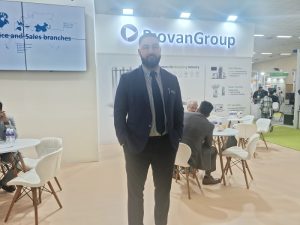
The Italy-based Piovan Group provides observatory solutions for materials handling and processing. The company is into deodorizing equipment, which is useful for removing odor from recycled products and end products. It has lab equipment to judge the quantity of benzene and acetyl dehydrate in the final recycled product.
The India office of the company, based in Pune, promoted its range of equipment at the event. The Piovan Group has a flagship company called Penta, which deals in bulk material handling solutions. It is operational from the Pune facility. Piovan Group has an office in Mumbai, which is a 100% representation of the Italy-based group.
“Recycling of different products is in different stages of development. PET recycling is at a very advanced stage with new technologies being introduced every day with a high level of investment. There are developments in PT recycling and PE recycling, which involve more polyolefins. We are talking more about mechanical recycling, but there is a separate market where people are investing in chemical recycling. A lot of that is happening around the Indian subcontinent,” Atul Suri, business & operations head – India at Piovan Group told Packaging South Asia.
India is growing very fast in recycling, he said, adding though mechanical recycling is more in vogue, stakeholders are investing to test the efficiency of chemical recycling. In recycling, the company is working with the Dalmia Group and another multinational company.
System Engineers & Consultants – PET washing plants
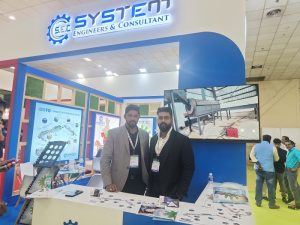
and Danish Mistry from System
Engineers and Consultants.
Photo PSA
Mumbai-based System Engineers & Consultants, a manufacturer of PET washing plants with output capacity of 500 kgs to 6,000 kgs, promoted its end-to-end solutions for washing systems, including sales, process, and manpower systems at the event. The company also has a setup for other plastics such as HDPE, LDPE, and PP with a 500 kg to 1,500 kg range of washing equipment for these plastics. It has a complete manufacturing setup in India.
The company has around 40 customers in India and abroad, Danish Mistry from System Engineers & Consultants told Packaging South Asia, adding it started operations in 2011. Indorama, VTech Fiber, Ganesha Ecoshpere, Pashupati Group, Amaani Polyflakes, and AeroFibre are some of its clients.
“The Indian plastics industry is growing very fast. Everybody is trying to meet government norms. We need more stakeholders to comply with these norms to ensure recycling and sustainability in the Indian plastics industry. Most of them are going for bottle-to-bottle grade plastic recycling. However, many innovations are coming for every department and all industries are going for reverse integration,” Mistry said.
Packem Umasree – PET to bulk bags
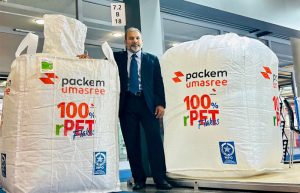
Packem Umasree, a joint venture between Brazil’s Packem S.A. and Indian company Umasree Texplast, launched its first plant in Ahmedabad in India to manufacture 100% sustainable flexible intermediate bulk containers (FIBC) or jumbo bags using recycled PET (used PET bottles) on 16 April. Punit Gopalka, CEO, Packem Umasree told Packaging South Asia that the plant will begin production in July-end.
“After the Covid-19 pandemic, there was a lot of demand for sustainable packaging. Countries such as the UK and the US have imposed plastic tax on the use of virgin plastic and provided certain benefits to users for using recycled plastic. With PET, even after recycling, the strength does not go down. We brought this technology to create FIBC containers from used PET bottles and set up the plant to supply packaging to the entire world,” Gopalka said.
Packem Umasree has clients from North and South America, UK, Spain and other parts of Europe. The company is supplying its FIBC bags to Yara Fertiliser to turn around its carbon footprint, as mentioned by Yara in its sustainability report. The company has tied up with Parle in Brazil, which will use the FIBC bags to collect PET bottles from the ocean, which will then be used in Packem Umasree’s manufacturing process.
Rudra Ecovation – Promoting safe recycled fabric
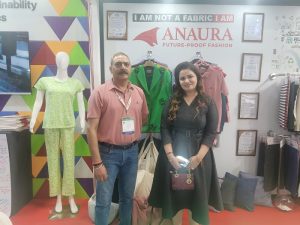
Ludhiana-based Rudra Ecovation is one of the largest recyclers in India. It recycles about 88 lakh PET bottles per day, Sanjeev Khanna, vice president, Rudra Ecovation, told Packaging South Asia.
The company converts PET bottles into fiber at 120 tonnes a day and 80 tons of yarn per day, which includes both filament yarn and spun yarn, he said. The company also makes non-woven carpets used for flooring. These yarns are utilized for in-house weaving where the company weaves 320,000 square meters of fabric every day.
“Earlier, there was a notion that recycled fabric is very rough and hazardous for the skin and non-breathable. We came out with our brand Anaura in February 2024, where we use specialized fabrics that are skin-friendly, totally non-toxic, and breathable,” Ishani Malhotra, director, Rudra Ecovation said. The company can make customized fabric and mix it with cotton and lycra as per the customers’ demand, she said, adding Anaura’s manufacturing does not involve cutting a single tree or harming any animal. The fabric dyeing at Rudra Ecovation does not involve water, so there is no water pollution as well, she claimed. The water used in-house is treated and used to irrigate a couple of thousand trees that we have planted, she added.
Anaura Home includes curtains, throws, and cushion covers that will soon be launched for the international market. “We are getting a lot of support from the market now and recycled fabric is seeing a lot of acceptance now among end-users as well,” she said.
Lucro – Focus on waste collection, sorting

Mumbai-based Lucro is an integrated waste management company where the work starts from the collection of waste material through its 16-plus collection centers. The waste goes into a sorting facility, a washing facility, and then a granulation center. It is converted into HDPE, LDPE and PP granules sold to converters, Pratibha Dewett, CSO at Lucro told Packaging South Asia. The company manufactures flexible packaging with 30-80 % of recycled content going into the manufacture of industrial packaging, including bunding rolls, stretch wraps, and shrink films.
Lucro is working with Coca-Cola, Dabur, Nestle, Mondelez, HUL, Marico and many automotive companies in India. The company has two waste collection centers in Mumbai and the rest in Umbergaon in Gujarat. “Transportation costs are huge, so we have tried to make the sourcing of the raw material more or less local. Manufacturing happens at the Gujarat facility from there we supply recycled industrial packaging all over the country. Our material goes to some plants in Siliguri, Coimbatore, Tamil Nadu, Karnataka, Kerala and Assam. We make garbage bags which we export to the US, UK and Germany,” she said.
“Plastic waste recycling in India is picking up with the government introducing EPR policies in the last two years. The EPR mandate ensures that companies use some amount of recycled materials in their packaging. Because of these policies, there has been an uptake in demand in India. A lot of people have shown interest in funding waste management companies as well,” she concluded.





